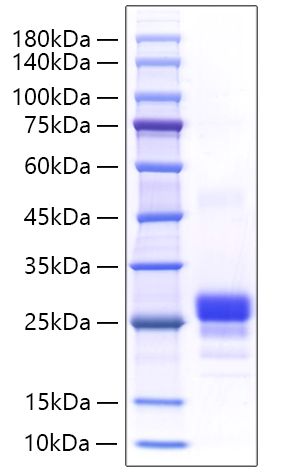Description
Recombinant Mouse TNFSF7/CD27 Ligand/CD70 Ligand Protein
The Recombinant Mouse TNFSF7/CD27 Ligand/CD70 Ligand Protein is a high-quality recombinant protein designed for murine biological research applications. This protein serves as an essential reagent in mouse model studies, comparative immunology research, and preclinical therapeutic evaluations, enabling scientists to investigate TNFSF7/CD27 Ligand/CD70 Ligand biology and its relevance to human disease mechanisms through translational research approaches.
This product (SKU: RPCB1288) is produced using HEK293 cells and features a N-his tag for convenient detection and purification. The protein exhibits a calculated molecular weight of 12.48 kDa with an observed molecular weight of 25-30 kDa under denaturing conditions, achieving ≥ 90% as determined by SDS-PAGE., ensuring exceptional quality and consistency for research applications.
Key Features
| High Purity by Affinity Chromatography | |
| Mammalian & Bacterial Expression Systems | |
| High lot-to-lot consistency via strict QC |
| Product Name: | Recombinant Mouse TNFSF7/CD27 Ligand/CD70 Ligand Protein |
| SKU: | RPCB1288 |
| Size: | 10 μg , 20 μg , 50 μg , 100 μg |
| Reactivity: | Mouse |
| Synonyms: | Cd70, Cd27l, Cd27lg, Tnfsf7,CD70 antigen, CD27 ligand, CD27-L, Tumor necrosis factor ligand superfamily member 7, CD70. |
| Tag: | N-his |
| Expression Host: | HEK293 cells |
| Calculated MW: | 12.48 kDa |
| Observed MW: | 25-30 kDa |
| Gene ID: | 21948 |
| Protein Description: | High quality, high purity and low endotoxin recombinant Recombinant Mouse TNFSF7/CD27 Ligand/CD70 Ligand Protein (RPCB1288), tested reactivity in HEK293 cells and has been validated in SDS-PAGE.100% guaranteed. |
| Endotoxin: | < 0.1 EU/μg of the protein by LAL method. |
| Purity: | ≥ 90% as determined by SDS-PAGE. |
| Formulation: | Lyophilized from a 0.22 μm filtered solution of PBS, pH 7.4. |
| Reconstitution: | Centrifuge the vial before opening. Reconstitute to a concentration of 0.1-0.5 mg/mL in sterile distilled water. Avoid vortex or vigorously pipetting the protein. For long term storage, it is recommended to add a carrier protein or stablizer (e.g. 0.1% BSA, 5% HSA, 10% FBS or 5% Trehalose), and aliquot the reconstituted protein solution to minimize free-thaw cycles. |
| Storage: | Store at -20℃.Store the lyophilized protein at -20℃ to -80 ℃ up to 1 year from the date of receipt. After reconstitution, the protein solution is stable at -20℃ for 3 months, at 2-8℃ for up to 1 week. |
CD70 is the ligand of CD27 in activated T and B lymphocytes, is an important cytokine in CD70-CD27 pathway involving with the generation and maintenance of T cell immunity. CD70 is a surface antigen, also shows antiviral activity and regulates viability of tumor cells and regulatory T cells. As for CD70 protein in mouse contains TNF_2 domain (60-190 a.a) and transmembrane helix, belonging to the tumor necrosis factor (TNF) family. CD70 (CD27 Ligand) belongs to the tumor necrosis factor (TNF) family, is the ligand for TNFRSF27/CD27. CD70 and CD27 are homotrimer type II and homodimer type I transmembrane glycoprotein, expressing on activated and resting T and B lymphocytes, respectively. As for a wildly use of CD70 in animal disease model, the sequence of amino acids in mouse is very different from human (56.25%) and rat (77.20%). CD70 as one of the most frequently mutated genes in a series of diffuse large B cell lymphomas, especially acts in a crucial Epstein-Barr virus (EBV)-specific T cell immunity and more generally for the immune surveillance of B cells. CD70 inhibits EBV infection by restoring the expansion of EBV-specific T lymphocytes stimulated by the CD70-deficient EBV-infected B cells. CD70 involves in activation of innate and adaptive immunity, expressing in the mature dendritic cells and being up-regulated upon the triggering of CD40 or Toll-like receptors. CD70 induces proliferation of costimulated T cells, enhances the generation of cytolytic T cells, and contributes to T cell activation. CD70 is also reported to play a role in regulating B-cell activation, cytotoxic function of natural killer cells, and immunoglobulin sythesis. targeting CD70 positive tumors with CAR-T cells induces a potent antitumor response.







